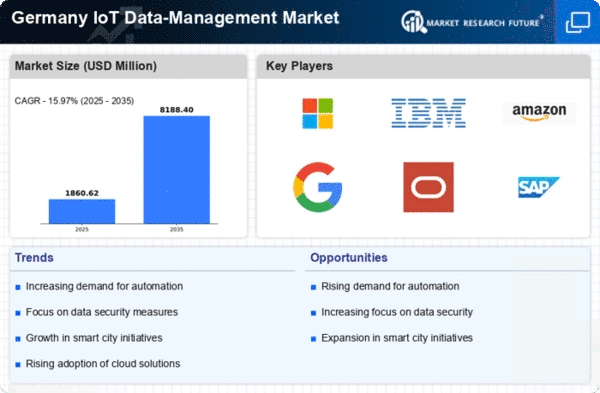Growing Need for Data Interoperability
The growing need for data interoperability among various IoT devices and platforms is a significant driver for the iot data-management market in Germany. As organizations deploy diverse IoT solutions, the ability to seamlessly integrate and manage data across different systems becomes paramount. This need is underscored by the increasing complexity of IoT ecosystems, which often involve multiple vendors and technologies. To address these challenges, companies are investing in data management solutions that promote interoperability, thereby enhancing operational efficiency. Consequently, the iot data-management market is likely to benefit from this trend as organizations seek to streamline their data processes.
Rising Demand for Smart Infrastructure
The increasing demand for smart infrastructure in Germany is a pivotal driver for the iot data-management market. As urbanization accelerates, cities are adopting smart technologies to enhance efficiency and sustainability. This trend is reflected in the German government's commitment to invest approximately €1 billion in smart city initiatives by 2025. Such investments necessitate robust data management solutions to handle the vast amounts of data generated by IoT devices. Consequently, the iot data-management market is poised for growth as organizations seek to implement effective data strategies to support smart infrastructure projects.
Increased Investment in Cloud Solutions
The shift towards cloud-based solutions in Germany is transforming the iot data-management market. Organizations are increasingly recognizing the benefits of cloud computing, such as scalability, flexibility, and cost-effectiveness. This trend is evidenced by a projected increase in cloud spending in Germany, which is expected to reach €30 billion by 2025. As businesses migrate their data management processes to the cloud, the demand for integrated IoT data management solutions is likely to surge. This transition not only enhances data accessibility but also facilitates real-time analytics, further driving the growth of the iot data-management market.
Expansion of Industrial IoT Applications
The expansion of Industrial IoT (IIoT) applications in Germany is a crucial driver for the iot data-management market. Industries such as manufacturing, logistics, and energy are increasingly leveraging IoT technologies to optimize operations and enhance productivity. According to recent estimates, the IIoT market in Germany is expected to reach €10 billion by 2026. This growth necessitates advanced data management solutions to process and analyze the vast amounts of data generated by connected devices. As a result, the IoT data-management market is likely to experience significant growth. as businesses seek to harness the potential of IIoT.
Regulatory Compliance and Data Governance
In Germany, stringent regulations regarding data protection and privacy, such as the General Data Protection Regulation (GDPR), significantly influence the iot data-management market. Companies are compelled to adopt comprehensive data management practices to ensure compliance with these regulations. This has led to an increased focus on data governance frameworks, which are essential for managing the lifecycle of data generated by IoT devices. As organizations strive to avoid hefty fines and reputational damage, the demand for sophisticated data management solutions is likely to rise, thereby propelling the growth of the iot data-management market.
















